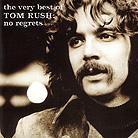November 1999
This collection covers an impressive span of years, from Rush’s 1962 live-recorded version of Jesse Fuller’s "San Francisco Bay Blues" -- a coffee house classic, still recorded today (e.g., by Ramblin’ Jack Elliot) -- through Rush’s own "River Song," recorded in 1998. Although I still find the two above-mentioned favorites to be very well done, this CD provides several other high points as well, and Rush’s slow, ponderous 1968 take on "Urge for Going" feels a bit dated even as compared with some of the other, earlier tracks. Take, for instance, Rush’s 1963 recording of Leroy Carr’s "Mobile-Texas Line." The skilled blues-guitar riffs and straightforward singing hold up as well as the blues tracks on the wonderful 1998 Geoff Muldaur CD I reviewed on this screen just a few months ago. Rush himself selected the tracks for this CD. That says a lot for his objectivity, for Rush has written many songs yet only included six of them among the 17 on his Very Best. "No Regrets," the album’s (sub)title song, is a fine lost-love ballad from his 1974 Ladies Love Outlaws LP. "There’s no regrets, no tears to cry/Don’t want you back, we’d only cry again/Say goodbye again." The impressive list of credits suggests the track’s texture and the kind of orchestration that had become fashionable with folksingers/singer-songwriters less than two decades after the folk revival had begun putting an acoustic guitar in every ranch house. In addition to Rush on vocals and acoustic guitar, we have Rupert Holmes string arrangement, conductor; Jeff Baxter electric guitar and pedal steel; Elliott Randall electric guitars; Bob Babbit (Kreinar) bass; Andrew Smith drums; Leon Pendarvis piano, Fender Rhodes; George Devens percussion; and Carly Simon vocal. Two tracks later on this CD but recorded four years earlier, Rush’s "Merrimac County," co-written with Trevor Veitch, has a leaner, mountain-ish folk sound, with just guitar, bass, vocals, dulcimer, violin and viola. Next-to-last is another of Rush’s very fine covers: Jackson Browne’s "Jamaica, Say You Will." What Rush’s 1984 version lacks by not having the legendary David Crosby/Graham Nash harmony that enabled Browne’s version to soar 12 years earlier when it led off his first LP, it makes up for with very appealing acoustic guitar introduction and accompaniment and skilled vocal harmony by Eric Lilljequiest and Dean Adrian in the refrain. The CD also contains covers of songs by folk-revival great Eric von Schmidt and by Eric Kaz, Lee Clayton, David Wiffen, and Bokker "Bukka" White. In all, The Very Best of Tom Rush: No Regrets offers attractive glimpses at a musician’s three-and-a-half-decade recording and performing career -- a career defined by talent and integrity and animated by a unique marriage of the artist’s quest for truth and beauty to the human craving for experience. The concluding track, "River Song," is so lovely that we can only hope Rush doesn’t decide not to "roam no more." GO BACK TO: |
 Tom Rush - The Very Best of Tom Rush: No Regrets
Tom Rush - The Very Best of Tom Rush: No Regrets![[Reviewed on CD]](../format/regcd.gif) My
fondest memories of Tom Rush, one of the best interpretive singers of the folk revival,
are of his excellent renditions of Murray McLaughlin’s "Child’s Song"
and Joni Mitchell’s "Urge for Going" -- a song Mitchell wrote before
production of her first LP (1967) but released only as the "B" side of a 1972
single, four years after Rush recorded it. Both of these songs appear on The Very Best
of Tom Rush: No Regrets, and it is enjoyable to hear them again, along
with several other engaging songs -- all sung in Rush’s unmistakable rich, warm voice
with that slightly ragged edge.
My
fondest memories of Tom Rush, one of the best interpretive singers of the folk revival,
are of his excellent renditions of Murray McLaughlin’s "Child’s Song"
and Joni Mitchell’s "Urge for Going" -- a song Mitchell wrote before
production of her first LP (1967) but released only as the "B" side of a 1972
single, four years after Rush recorded it. Both of these songs appear on The Very Best
of Tom Rush: No Regrets, and it is enjoyable to hear them again, along
with several other engaging songs -- all sung in Rush’s unmistakable rich, warm voice
with that slightly ragged edge.